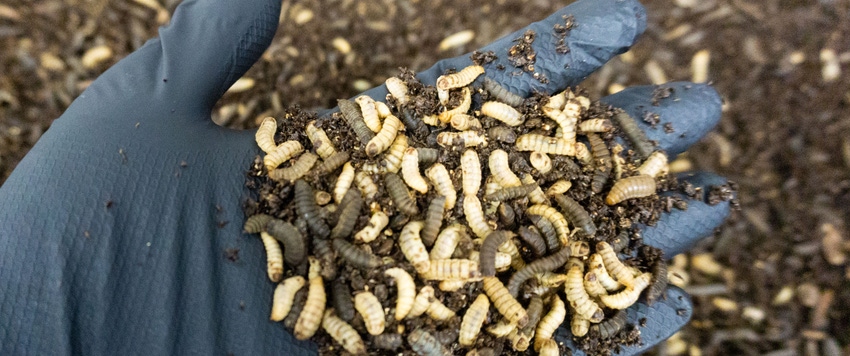FarmInsect has developed technology to breed insect larvae as protein feed for farmed animals.
September 23, 2020

The startup company FarmInsect in Germany has developed a technology to breed insect larvae as protein feed for farm animals. Founded by graduates of the Technical University of Munich (TUM), the company plans to start a pilot plant at one of the largest fish farms in Bavaria, Germany, within a few weeks.
The founders of FarmInsect — Wolfgang Westermeier, Thomas Kühn and Andre Klöckner — developed their company based on the principle of using agricultural biomass in a circular economy, TUM said in an announcement. Accordingly, residues that accumulate in the region, such as harvest or peeling residues from an agricultural operation or residues from the regional food industry, such as spent grain or bread, can be used to fatten and feed insect larvae, which can, in turn, be used as feed for livestock animals.
The use of insect meal in aquaculture has been legally permitted in the European Union since the end of 2017, and approval for use in poultry and finishing pigs is expected in 2021, especially since feeding live insects to chickens, pigs and fish is already permitted, TUM explained.
“Our decentralized method of insect production offers the ability to feed the larvae live, because there are no long transport routes. This stimulates the animals to beck and burrow (their natural instincts) more effectively and, thus, promotes animal welfare,” said Westermeier, an agricultural scientist.
Producing feed locally
According to TUM, FarmInsect supplies insect breeding systems that can be integrated modularly into the infrastructure of any animal breeding farm.
“The most difficult thing is to turn eggs into juvenile larvae,” said Kühn, FarmInsect managing director and co-founder. Therefore, FarmInsect breeds the young larvae of the black soldier fly -- a particularly undemanding and robust insect species -- in its own facility and delivers them to farms on a regular basis and in accordance with the respective regulations.
In one week of fattening, the young larvae can grow to as large as 1.5 cm in a climate chamber and increase their weight by a factor of 1,000, TUM said. To produce their insect feed, operators only have to fill a mixing pot with biomass and load the climate chamber with young larvae and then unload it with the adult larvae. The larvae can then be fed directly to farm animals — mainly fish as of now, but probably also chickens or pigs in the future.
When using regional residues as feed, the strict regulations of feed legislation must be observed. A special challenge is the complete traceability of their origins. “We have developed an [information technology] platform to document this,” said Klöckner, who is responsible for technical development and programming.
TUM food technology center
The founders are an interdisciplinary team from the fields of agricultural sciences, electrical and computer engineering and economics who got to know each other through projects at TUM.
“The decisive factor for us was that we were able to use rooms in the TUM’s food technology center at Weihenstephan that were suitable for our first larval breeding,” Westermeier said.
“The TUM startup advising team also provided us with contacts in agriculture, the World Agricultural Systems Center--Hans Eisenmann-Forum and EIT-Food,” Kühn said. In addition, Wilhelm Windisch, TUM professor of animal nutrition, has been providing support to the startup. UnternehmerTUM, the center for innovation and startups, has also put FarmInsect in touch with investors and cooperation partners.
Pilot plant
FarmInset has been supported by the Bavarian Ministry of Agriculture and the EU since April 2020 as part of the European Innovation Partnerships program, TUM said.
In the summer of 2020, FarmInsect was accepted into the EIT Food Accelerator Network of the EU as one of the "most promising food and agritech startups in Europe," and in a few weeks, a pilot plant will be commissioned at one of the largest aquaculture enterprises in Bavaria, the announcement said.
TUM is one of Europe’s leading research universities, with around 600 professors, 43,000 students and 10,000 academic and non-academic staff. Its focus areas are the engineering sciences, natural sciences, life sciences and medicine, combined with economic and social sciences. TUM acts as an entrepreneurial university that promotes talents and creates value for society.
You May Also Like


.png?width=300&auto=webp&quality=80&disable=upscale)
